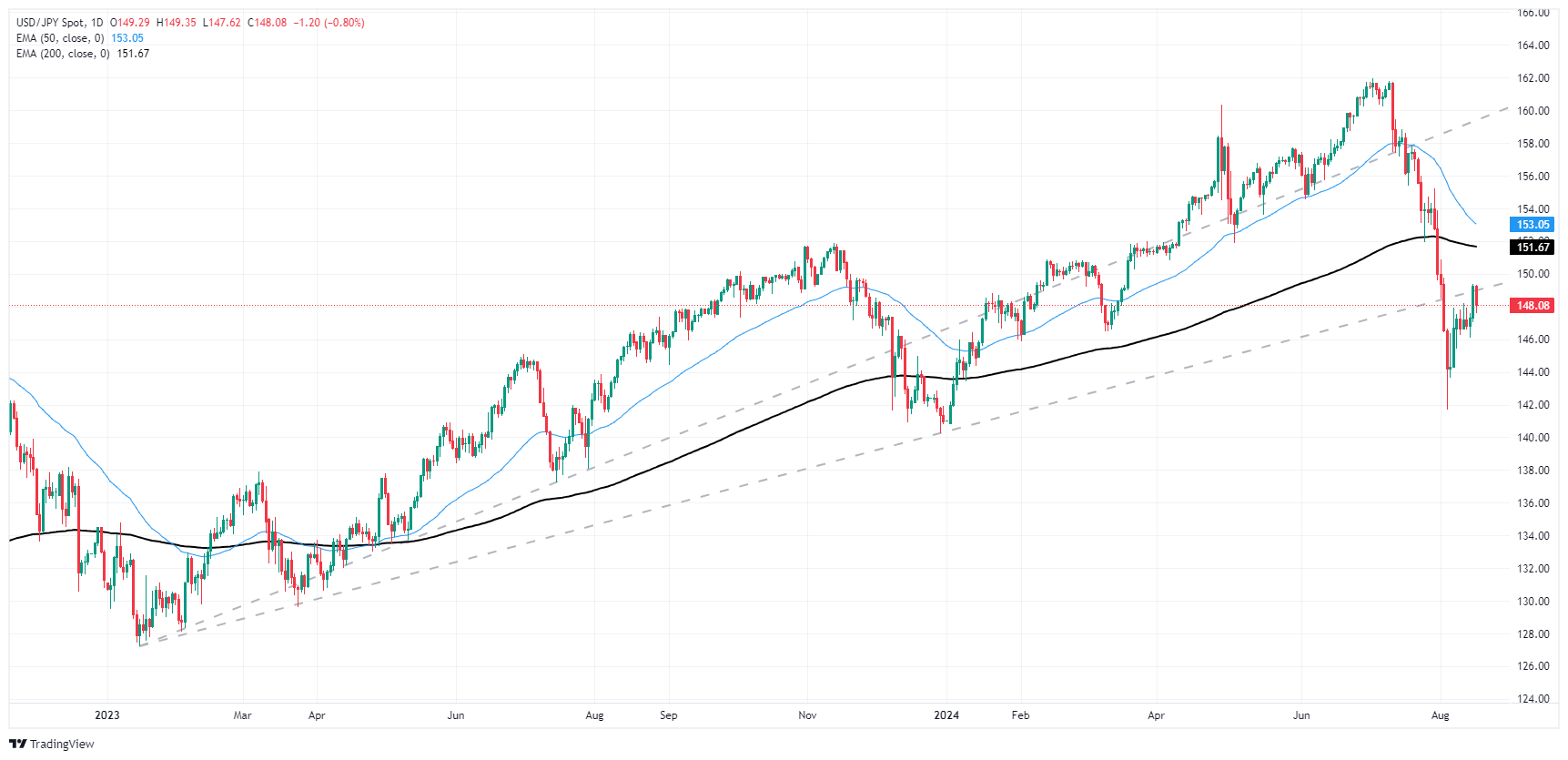- Analytics
- News and Tools
- Market News
- USD/JPY eases back after consumer sentiment results boost investor mood
USD/JPY eases back after consumer sentiment results boost investor mood
- USD/JPY waffled back below 149.00 on Friday as risk appetite recovers balance.
- The US Dollar sees selling pressure across the board to wrap up the trading week.
- Coming up next week: Japanese national inflation data and the start of Jackson Hole.
USD/JPY eased lower on Friday, slipping below 149.00 early in the day and testing near the 148.00 handle. The US Dollar is getting sold off across the board as broad-market sentiment recovers on the back of an upturn in US consumer sentiment figures.
The University of Michigan’s Consumer Sentiment Index showed a firmer-than-expected recovery in surveyed consumers’ outlook in August, rising to 67.8 from the previous 66.4, handily beating the forecast 66.9. Investors grabbed ahold of the headline print and piled back into riskier assets while selling the Greenback, despite the UoM 5-year Consumer Inflation Expectations in August holding steady at 3%, and a slight decay in UoM Consumer Current Conditions outlook, which eased to 60.9 from 62.7, entirely reversing direction on the forecast 63.1.
Next week will open with a quiet tinge to the economic calendar, and the key print for the Yen will be Japanese National Consumer Price Index (CPI) inflation figures, while US traders will be turning to focus on the kickoff of the Jackson Hole economic symposium later in the week.
USD/JPY price forecast
Friday’s decline in USD/JPY bids has dropped the pair back below a rising trendline on daily candlesticks, but price action is still drifting into the high end as buyers take a breather. USD/JPY continues to trade on the south side of the 200-day Exponential Moving Average (EMA) near 151.67, and a poorly-timed break in bullish pressure could see another shortside technical leg begin to form as intraday bids grapple with technical levels below 149.00.
USD/JPY daily chart
Japanese Yen FAQs
The Japanese Yen (JPY) is one of the world’s most traded currencies. Its value is broadly determined by the performance of the Japanese economy, but more specifically by the Bank of Japan’s policy, the differential between Japanese and US bond yields, or risk sentiment among traders, among other factors.
One of the Bank of Japan’s mandates is currency control, so its moves are key for the Yen. The BoJ has directly intervened in currency markets sometimes, generally to lower the value of the Yen, although it refrains from doing it often due to political concerns of its main trading partners. The current BoJ ultra-loose monetary policy, based on massive stimulus to the economy, has caused the Yen to depreciate against its main currency peers. This process has exacerbated more recently due to an increasing policy divergence between the Bank of Japan and other main central banks, which have opted to increase interest rates sharply to fight decades-high levels of inflation.
The BoJ’s stance of sticking to ultra-loose monetary policy has led to a widening policy divergence with other central banks, particularly with the US Federal Reserve. This supports a widening of the differential between the 10-year US and Japanese bonds, which favors the US Dollar against the Japanese Yen.
The Japanese Yen is often seen as a safe-haven investment. This means that in times of market stress, investors are more likely to put their money in the Japanese currency due to its supposed reliability and stability. Turbulent times are likely to strengthen the Yen’s value against other currencies seen as more risky to invest in.
© 2000-2026. All rights reserved.
This site is managed by Teletrade D.J. LLC 2351 LLC 2022 (Euro House, Richmond Hill Road, Kingstown, VC0100, St. Vincent and the Grenadines).
The information on this website is for informational purposes only and does not constitute any investment advice.
The company does not serve or provide services to customers who are residents of the US, Canada, Iran, The Democratic People's Republic of Korea, Yemen and FATF blacklisted countries.
Making transactions on financial markets with marginal financial instruments opens up wide possibilities and allows investors who are willing to take risks to earn high profits, carrying a potentially high risk of losses at the same time. Therefore you should responsibly approach the issue of choosing the appropriate investment strategy, taking the available resources into account, before starting trading.
Use of the information: full or partial use of materials from this website must always be referenced to TeleTrade as the source of information. Use of the materials on the Internet must be accompanied by a hyperlink to teletrade.org. Automatic import of materials and information from this website is prohibited.
Please contact our PR department if you have any questions or need assistance at pr@teletrade.global.















